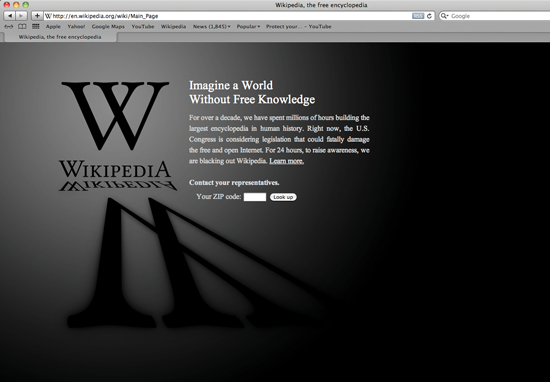
Internet blackout — Sites like Wikipedia and Google protested SOPA and PIPA by showing what the world would be like without access to their databases. Photo credit: Ruth Bibby
Bills SOPA, PIPA serve as efforts by Congress to reign in unbridled internet freedoms
The Internet — perhaps known as the most innovative invention since toilet paper, the light bulb or even Willy Wonka and the Chocolate Factory — generates global use from billions of members worldwide.
The Internet has impacted the world in such a way that communication has become pretty much limitless. With abundant access to education, imagination and invention, the internet has been wrongfully taken advantage of in numerous ways, by numerous individuals. In response to this, the Stop Online Piracy Act (SOPA, of the House of Representatives) and Protect IP Act (PIPA, of the U.S. Senate) took copyright infringement to an entirely new level, in that both bills were constructed in such a way that “the law wouldn’t have been able to reach the intended goals in stopping online piracy,” Vice President, Dean and Professor of Law at Liberty University Mathew D. Staver said.
Just two weeks ago, world-renowned search engines such as Google, Wikipedia, Mozilla and many other popular sites demonstrated their distaste for SOPA and PIPA — resulting in a 24-hour “blackout” in reference to what the Internet would be like if the proposed bills were to pass.
As a result, uproar began to flourish in Washington, D.C., along with the rest of the “Internet-accessible” world.
“The bills were poorly constructed,” consultant and author of “Technology, Strategy and the Law” Larry Downes said. In the event that the U.S. Government accurately witnessed copyright infringement by foreign, rogue sites, the issue wouldn’t be solvable because the case lies out of the jurisdiction of the United States,” Downes said.
SOPA and PIPA, if passed, would have created a much larger problem than the problem of piracy itself. It’s like the idiom “the cart before the horse,” Downes said.
While both bills had the right intention to stop online piracy and protect IPs, both were interfering with the First Amendment in regards to Freedom of Speech.
“An alternative act called the Open Act, while still imperfect, would have been a more practical approach toward controlling online piracy,” Downes said.
According to the Electronic Frontier Foundation, the Anti-Counterfeiting Trade Agreement (ACTA) has been negotiated among many other countries throughout the world, including the U.S., concerning agreements on dealing only with counterfeit physical goods. Now, it has been made publicly clear that content in the treaty would have a much broader scope in dealing with Internet distribution and information technology.
“With much innovative and technical advancement made possible by the Internet, SOPA and PIPA, if passed, would have been responsible for millions of people losing their jobs and eliminating access to educational sites, among other innocent Internet activity,” Downes said.
Communications Professional and Professor at Liberty University Dr. Carey Martin described SOPA and PIPA as “an effort to combat an actual problem of online piracy,” but in his opinion, “it is an overreaching effort.”
“Research would become much more challenging online due to the fact that there seems to be a fairly broad provision in the law that would not only shut down actual pirates, but rather be used to close down a site that linked to a pirated site,” Martin said.
In the event that SOPA and PIPA were to be passed, “the end result would have consisted of shutting down uncounted numbers of legitimate sites,” Martin said.
“As a creative professional who has done quite a lot of production and put things out for consumption, I’m foursquare behind protecting copyright, and I think the Recording Industry Association of America (RIAA) and the Motion Picture Association of America (MPAA) have legitimate concerns. I just don’t think this law is the best way to address these concerns,” Martin said.
Many people worldwide have stressed these exact concerns. So much so that the bills are under heavy-handed revision. Although the two bills were “shelved,” the future of online piracy will only continue to be more eagerly addressed, making the Internet a more controlled environment. The Internet wins this battle, for now.